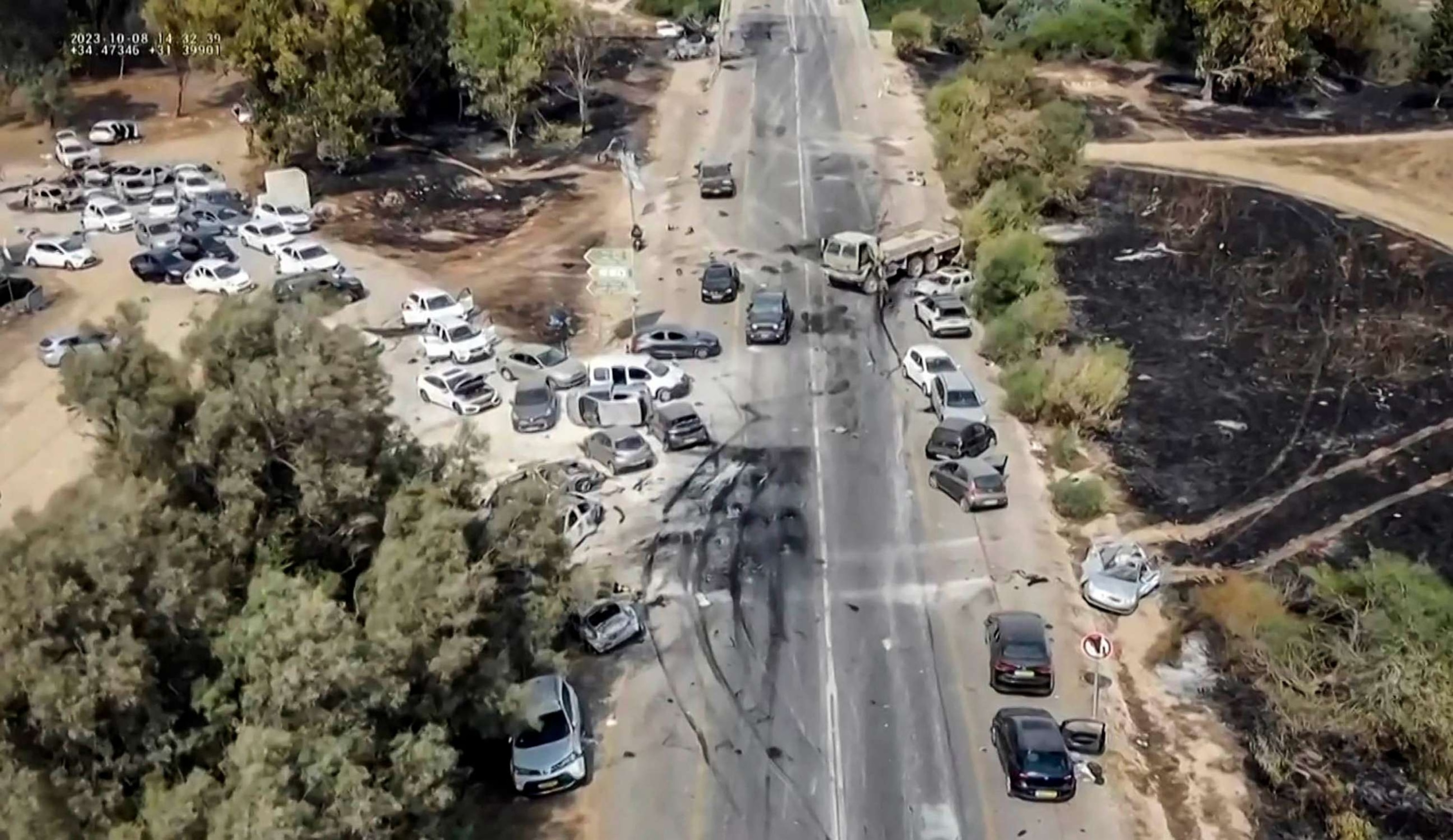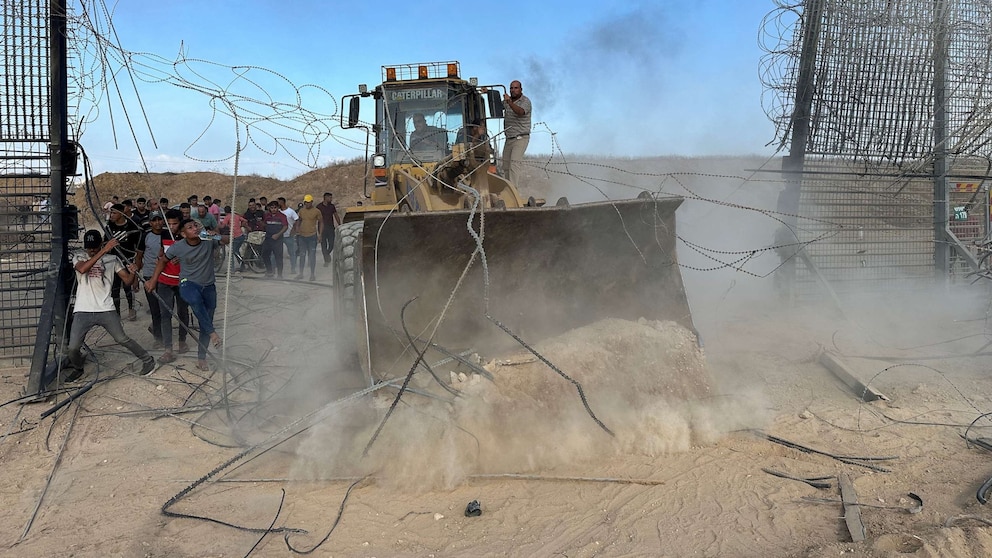With its barrage of coordinated attacks against Israel over the weekend, Hamas shocked much of the world on a variety of levels — the horrific images of violence against civilians, the lack of warning from intelligence communities, and the sheer scope and scale of the onslaught.
This last element of the assault, in particular, has some politicians and experts questioning whether Hamas could have acted alone — or if the militant group the U.S. designates as terrorists had help from its longtime benefactor and ally: Iran.
Despite that, U.S. officials were quick to push back on what are it says are so far unsubstantiated claims that Tehran played a critical role in orchestrating the attack in its immediate aftermath. And on Monday, White House spokesperson John Kirby said although Iran bore “a degree of complicity,” the administration had yet to uncover “hard, tangible evidence” of its involvement.

Palestinians break into the Israeli side of Israel-Gaza border fence after gunmen infiltrated areas of southern Israel, Oct. 7, 2023.
Mohammed Fayq Abu Mostafa/Reuters
Although Iran’s President Ebrahim Raisi congratulated Hamas for what he called a “victory” over Israel, a spokesperson for the Iranian mission to the United Nations also denied allegations that Tehran played a hand in the Hamas offensive, claiming that the Israeli government is trying to justify its own apparent national security failure by blaming Iran.
While Israeli officials were initially bold and direct in leveling accusations against Iran, many on Monday took a more measured tone. In his address to his country on Monday, Prime Minister Benjamin Netanyahu did not mention Iran, and in a televised interview, Israel’s ambassador to the U.S. Michael Herzog was careful to note that his government was not “one hundred percent sure” Iran provided operational support for the attacks.
“It wouldn’t surprise me if there was a concrete Iranian role behind the scenes,” Herzog added.

Iranian President Ebrahim Raisi looks on during a press conference concluding his appearance at the United Nations General Assembly, in New York City, Sept. 20, 2023.
Shannon Stapleton/Reuters, FILE
Indeed, for some experts and U.S. officials who have tracked Hamas for years, the scenario that stretches credulity is that Hamas could have so drastically escalated its strategy and capabilities without significant assistance.
“The coordination of multiple penetrations of Israel’s barrier — the border fence that had been created — the ability to penetrate it in multiple places, possibly with the help of a cyberattack,” said Jonathan Schanzer, a former terrorism finance analyst for the Treasury Department and the senior vice president for research at the Foundation for the Defense of Democracies. “All of this points to a sophistication that we’ve not seen by Hamas.”
Both Schanzer and Suzanne Maloney, an adviser on Iran policy for multiple administrations and the vice president and director of the Foreign Policy program at the Brookings Institution, see Iran as the only possible suspect.
“It is quite well known that the Iranian government is the primary backer, both financial and in terms of military equipment of Hamas and a number of other Palestinian militant groups,” said Maloney, adding that there is an “enormous amount of contact — frequent, regular and often public” between Tehran and the organizations.
“It’s impossible to imagine that an operation this ambitious, on a scope and scale of what we’ve seen over the course of the past few days didn’t have some foreknowledge and or complicity by the Iranian leadership,” she added.

An Israeli firefighter hands a drink to a young child next to a site struck by a rocket fired from the Gaza Strip, in Ashkelon, southern Israel, Oct. 9, 2023.
Ohad Zwigenberg/AP
Tehran’s next steps?
Israeli officials backtracking on blaming Iran might be an attempt to avoid jumping ahead of investigations into the Islamic regime’s role in the attacks. They could also be attempting to avoid encouraging Tehran to ramp up aid for Hamas as Israel prepares for what could be a lengthy fight across multiple fronts.
Iran already funnels roughly $100 million to Hamas each year, according to the Israeli government, and the State Department has previously acknowledged that Tehran has provided the group with training and military equipment.
Maloney says while it’s unlikely Iran would become directly involved in the fighting, it could ramp up its support for Hamas militants — potentially drawing out the conflict and sewing more unrest.
“The Iranians would seek to bolster Hamas as capabilities if they are significantly eroded,” she said.
“Depending on supply lines, it’s going to be a complicated route, but the Iranians have built in a lot of redundancy for Hamas,” Maloney continued. “There’s a real probability that Iran will remain part of the equation even if it’s not directly engaged in the conflict itself.”
Schanzer notes that Tehran also has significant sway over Hezbollah, a Lebanese terror group already trading fire with Israel on the opposite side of the country from Gaza.
“This could open up an entirely new front,” he said. “Hezbollah maintains an arsenal of roughly 150,000 to 180,000 rockets–all provided by Iran. That’s roughly ten times what Hamas has in its arsenal.”

A grab taken from a UGC video posted on the Telegram channel “South First Responders”, Oct. 9, 2023, shows the aftermath of an attack on the Supernova music Festival by Palestinian militants, near Kibbutz Reim in the Negev desert in southern Israel on October 8.
South First Responders/AFP via Getty Images
Backlash against Biden administration
On Capitol Hill, Republicans were quick to slam the Biden administration for recently facilitating Tehran’s access to roughly $6 billion in Iranian oil revenue tied up by U.S. sanctions in exchange for the release of five American prisoners.
“Do we not realize that weakening America strengthens our enemies? Allowing Iran to produce more oil, appeasement, and paying ransoms for American hostages, has only made us weaker on the world stage,” former House Speaker Kevin McCarthy said on Monday, calling on the White House to refreeze the billions released as part of the deal.
While administration officials have said repeatedly there are guardrails in place to ensure that Tehran can put the money only toward humanitarian causes and that so far the regime hasn’t been able to access any of it, both Schanzer and Maloney say President Joe Biden’s strategy toward Iran has contributed to instability in the Middle East.
“The administration’s approach to Iran has helped to condition Iranian aggression across the region because they believe that it pays off for them,” said Maloney.
Schanzer also argued that the administration’s narrow focus on reining in Iran’s nuclear program has created a blind spot, allowing Tehran’s other nefarious endeavors to flourish.
“The focus has been myopic on the nuclear front and by not explicitly addressing the terror support, this is the result that you get,” Schanzer said.

